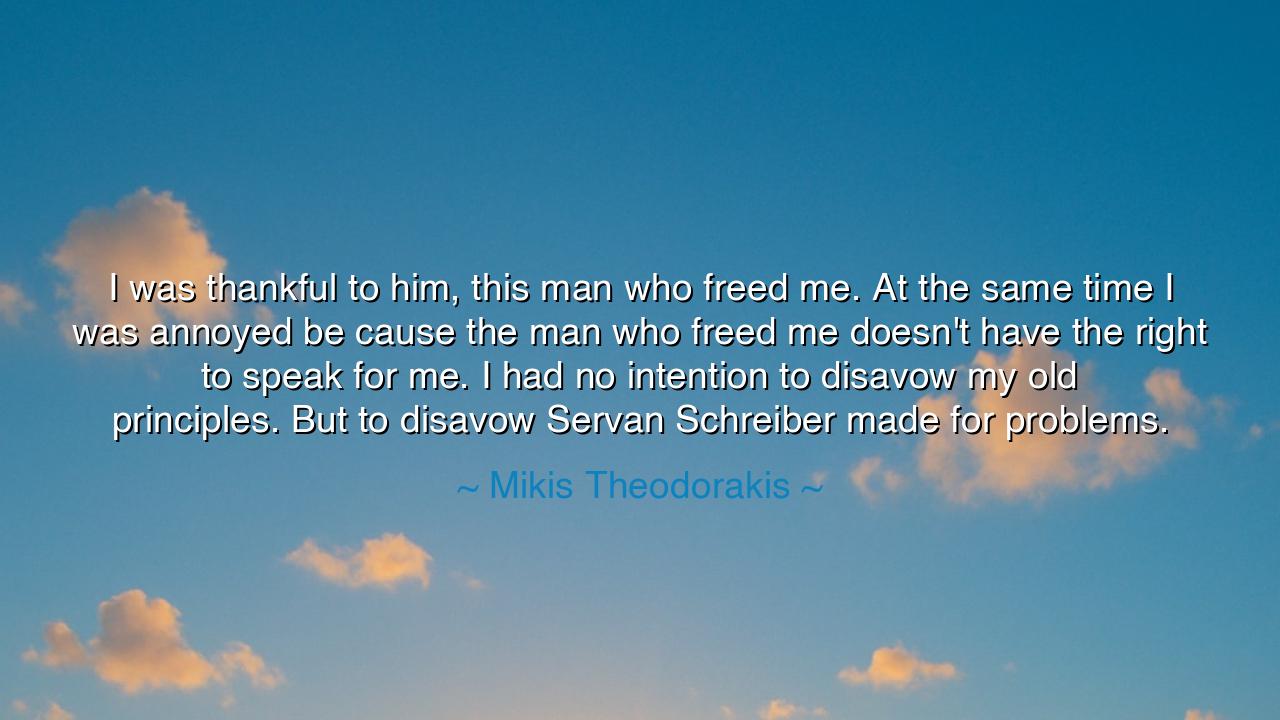
I was thankful to him, this man who freed me. At the same time I
I was thankful to him, this man who freed me. At the same time I was annoyed be cause the man who freed me doesn't have the right to speak for me. I had no intention to disavow my old principles. But to disavow Servan Schreiber made for problems.






Mikis Theodorakis, the composer, revolutionary, and voice of a nation, once declared: “I was thankful to him, this man who freed me. At the same time I was annoyed because the man who freed me doesn't have the right to speak for me. I had no intention to disavow my old principles. But to disavow Servan Schreiber made for problems.” His words reflect the tension between gratitude and independence, between honoring the hand that opens a prison door and resisting the chains of obligation that such a hand might impose. They are the words of a man who understood that freedom is only complete when it preserves both the body and the conscience.
The origin of this statement lies in Theodorakis’ years of struggle during the Greek military junta of 1967–1974. Imprisoned for his political convictions, he was released in part through the efforts of French journalist and politician Jean-Jacques Servan-Schreiber. Yet liberation did not come without cost. Theodorakis was grateful for the act, but wary of being claimed as someone else’s political trophy. For he was not merely a man freed from chains; he was a man bound by principles, unwilling to let another speak in his name or dilute the ideals for which he had suffered.
History offers many mirrors of this struggle. Consider Socrates, who, when given the chance to escape execution, refused. He would not accept a freedom purchased at the price of abandoning his principles. Or reflect on Nelson Mandela, who, after twenty-seven years of imprisonment, emerged with gratitude toward those who supported him, but also with an unyielding determination not to surrender his vision of equality to the interests of others. In both men, as in Theodorakis, we see the sacred truth: freedom without integrity is no freedom at all.
At the heart of Theodorakis’ words lies the delicate balance of gratitude and autonomy. Gratitude is noble, but it must never become servitude. To thank the one who helps us is right and just, but to surrender our voice to them is to exchange one set of chains for another. Theodorakis teaches us that true liberation must preserve both the body and the conscience — the outer freedom and the inner truth.
To the youth, his lesson is clear: do not abandon your principles in exchange for favors. Be grateful when others aid you, but remember that your voice, your beliefs, your identity, must remain your own. For those who speak in your name without your consent steal from you the very essence of freedom. It is better to face hardship in truth than to live in comfort built on disavowal.
To leaders and benefactors, there is another teaching: do not demand submission from those you help. True service frees without claiming ownership, uplifts without silencing. The greatest honor for a liberator is not in having another bend to their will, but in seeing them stand tall, unshackled in both body and spirit.
The eternal wisdom here is this: freedom is twofold — the breaking of external chains and the preservation of inner principles. Gratitude must be given, but not at the price of autonomy. Theodorakis, in his words, shows us that the highest form of thankfulness is to remain true to oneself, even while honoring the sacrifices of others.
Thus, let the teaching be remembered: when help comes, receive it with humility, honor it with gratitude, but guard your truth with steadfastness. For no man, however noble, has the right to speak for your soul. True freedom is not given — it is lived, defended, and kept sacred within.






AAdministratorAdministrator
Welcome, honored guests. Please leave a comment, we will respond soon